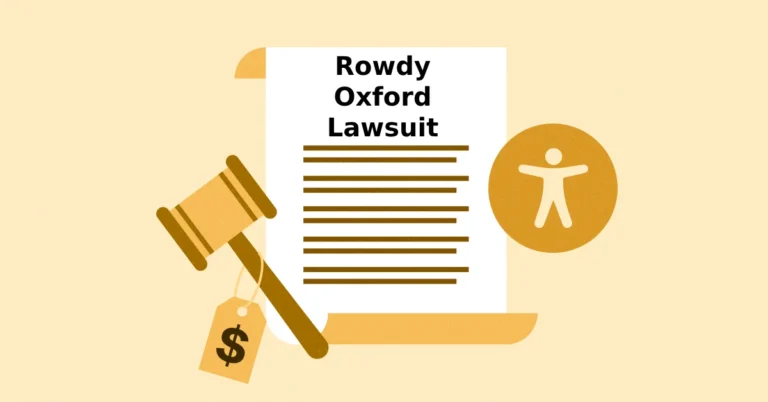The Rowdy Oxford Lawsuit represents a landmark civil action in defense sector compliance that has sent shockwaves through the corporate world. This high-stakes legal dispute between Integris Composites and former executive Rowdy Lane Oxford highlights critical issues surrounding corporate espionage, executive ethics, and intellectual property theft in the defense industry.
The legal proceedings have established new precedents for how trade secret litigation unfolds in federal courts.
Who Sued and Why?
Integris Composites, Inc., a leading manufacturer of advanced armor systems for military and law enforcement, filed a lawsuit against its former Vice President of Business Development, Rowdy Lane Oxford. The plaintiffs alleged that Oxford committed multiple violations, including breach of contract, data theft, and misappropriation of trade secrets—actions that constitute serious corporate misconduct within the federal court system.
Oxford, a seasoned executive with over 25 years of experience in the defense sector and distinguished military service in both the U.S. Marine Corps and Army Reserve, held a position of significant trust at Integris. His role involved managing strategic sales, government contracts, and maintaining relationships within the military procurement industry. This access made the alleged fraud allegations particularly serious for the defense contractor, as the case evolved from a simple employment dispute into a complex matter involving executive malfeasance.
The defendants in this litigation faced accusations of downloading and transferring approximately 9,000 private company files before resigning to join competitor Hesco Armor. These files allegedly included proprietary information, For Official Use Only data, Controlled Unclassified Information (CUI), and export-controlled data, representing a potential national security concern. The scope of this alleged digital theft demonstrates the sophisticated nature of modern confidential information breaches within defense contractors.
Timeline of Key Events
September 2023
Oxford’s Resignation
- Rowdy Lane Oxford formally resigned from the Vice President position at Integris Composites
- Began transition to join Hesco Armor, a foreign-owned competitor
September 2023 (Final Two Weeks)
Alleged Data Theft Period
- Forensic evidence shows Oxford allegedly accessed and copied thousands of sensitive files
- Downloaded customer account information for 10+ clients in the military/law enforcement sectors
- Transferred approximately 9,000 private company files, including export-controlled data
Late 2023 – Early 2024
Discovery Through Whistleblower
- An employee at Hesco Armor discovered suspicious documents
- The whistleblower contacted investigators about potential stolen materials
- Oxford was immediately terminated by Hesco Armor
- The company cooperated fully with the investigation
February 27, 2024
Legal Action Initiated
- Integris Composites completed a complaint filing in the U.S. District Court (Western District of North Carolina)
- Legal matter assigned to Judge Frank D. Whitney and Magistrate Judge Susan C. Rodriguez
- The court granted an immediate preliminary injunction and a temporary restraining order
- Certain documents are sealed due to their proprietary/sensitive nature
March – December 2024
Litigation Process
- Intensive discovery phase with evidence exchange between parties
- The legal case progressed through various litigation stages
- Both sides prepared arguments and gathered supporting documentation
- The court maintained restrictions on Oxford’s use of alleged stolen information
January 12, 2025
Case Resolution
- Judge Max Cogburn signed the Consent Final Order
- Settlement agreement reached without full trial
- Oxford accepted restrictions without admitting guilt
- The case was formally concluded with comprehensive protective measures for Integris
Main Allegations and Evidence
The comprehensive claim against Oxford cited multiple federal laws designed to protect companies from insider threats. The Uniform Trade Secrets Act (UTSA) formed the cornerstone of the complaint, as Integris argued that the 9,000+ files constituted protected intellectual property and trade secrets. This legal action represents a classic example of how modern litigation (derived from the Latin “litigare,” meaning “to dispute”) addresses digital-age corporate theft.
Additional legal grounds included violations of the Computer Fraud and Abuse Act (CFAA), which addresses unauthorized access to computer systems, and breaches of fiduciary duty obligations. The breach of contract allegations centered on Oxford’s violation of non-disclosure agreements and confidentiality commitments that were integral to his executive position.
The evidence revealed a sophisticated pattern of file access and transfer that occurred systematically in the weeks before Oxford’s departure. Integris employed forensic auditing tools to detect unauthorized downloads and file access, setting new standards for internal monitoring practices in defense technology companies.
This court injunction case bears a resemblance to corporate espionage scenarios, highlighting how proprietary knowledge about supply chains, technology specifications, and pricing strategies can be weaponized against companies. The defense contractor industry’s interconnected nature made the potential damage from such information sharing particularly severe.
What Happens Next?
Rather than proceeding to a full trial, the parties resolved through settlement talks. On January 12, 2025, Judge Max Cogburn of the Western District of North Carolina signed a Consent Final Order that formally concluded the legal battle—a settlement agreement that stands in stark contrast to the initial corporate misconduct allegations.
Under the terms of this court-approved agreement, Oxford accepted several significant restrictions without admitting guilt, demonstrating legal compliance moving forward. The settlement required him to destroy or return all proprietary data from Integris, prohibited future employment with Hesco Armor or any direct competitor for a specified period, and banned him from seeking government contracts or contacting Integris clients and vendors.
The consent order also mandated that Oxford submit his electronic devices for forensic review to ensure complete removal of any confidential information. This court ruling effectively ended Oxford’s career in the defense contracting sector while providing Integris with comprehensive protection for its intellectual property.
The resolution of the Rowdy Oxford Lawsuit has established important precedents for the defense industry regarding executive mobility, data governance, and insider threat prevention. Companies across the sector are now implementing enhanced cybersecurity measures and stricter protocols for employee transitions, particularly when executives move to competing firms. This case demonstrates how a single legal matter can reshape industry-wide practices and establish new standards for trade secret protection.
Disclaimer: This analysis provides a general overview of the Rowdy Oxford Lawsuit based on publicly available court records and verified news reports, intended for informational purposes only.

